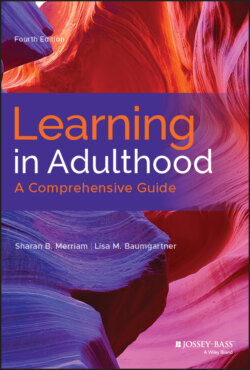Читать книгу Learning in Adulthood - Sharan B. Merriam - Страница 57
Summary
ОглавлениеParticipation is one of the more thoroughly studied areas in adult education. We have a sense of who participates, what is studied, and what motivates some adults and not others to enroll in a course or undertake an independent learning project.
Although there were numerous small-scale studies of participation in the 40 years between the inauguration of the field of adult education and the 1960s, it was not until 1965 that the first national study of participation was published. Johnstone and Rivera's study, with its care in defining participation and selecting methods of data collection and analysis, remains a benchmark contribution to this literature. Subsequent surveys by the NCES, UNESCO (Valentine, 1997), and Program for the International Assessment of Adult Competencies-USA's (PIAAC-USA) (Patterson, 2018) have contributed to this database. Regardless of the study, the profile of the typical adult learner in formal educational activities remains remarkably consistent: White, middle class, employed, younger, and better educated than the nonparticipant. Further, employment-related reasons account for the majority of participant interest in continuing education.
Why adults do or do not participate in adult education is an important question, having implications for both theory and practice. Surveys have uncovered both reasons for, and barriers to, participation. The work on determining an underlying structure of motivational orientations begun by Houle (1961/1988) has been carried on most notably by Boshier's research using the EPS. Further, explanations of participation have been advanced from a sociological rather than a psychological perspective. In these analyses, people's decisions to participate have less to do with their needs and motives than with their position in society and the social experiences that have shaped their lives.
Finally, we “problematized” the current understanding of participation by questioning and critiquing four assumptions about participation presented by Crowther (2000). These four assumptions are that participation is a good thing, that participation equals formal learning, that learners are abstract, not socialized individuals, and that there are barriers, not resistance, to participating in formal adult learning activities.
